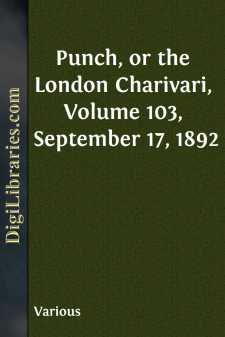Categories
- Antiques & Collectibles 13
- Architecture 36
- Art 48
- Bibles 22
- Biography & Autobiography 813
- Body, Mind & Spirit 142
- Business & Economics 28
- Children's Books 17
- Children's Fiction 14
- Computers 4
- Cooking 94
- Crafts & Hobbies 4
- Drama 346
- Education 46
- Family & Relationships 57
- Fiction 11829
- Games 19
- Gardening 17
- Health & Fitness 34
- History 1377
- House & Home 1
- Humor 147
- Juvenile Fiction 1873
- Juvenile Nonfiction 202
- Language Arts & Disciplines 88
- Law 16
- Literary Collections 686
- Literary Criticism 179
- Mathematics 13
- Medical 41
- Music 40
- Nature 179
- Non-Classifiable 1768
- Performing Arts 7
- Periodicals 1453
- Philosophy 64
- Photography 2
- Poetry 896
- Political Science 203
- Psychology 42
- Reference 154
- Religion 513
- Science 126
- Self-Help 84
- Social Science 81
- Sports & Recreation 34
- Study Aids 3
- Technology & Engineering 59
- Transportation 23
- Travel 463
- True Crime 29
Punch, or the London Charivari, Volume 103, September 17, 1892
by: Various
Categories:
Description:
Excerpt
HEARING HIMSELF.
(Mysterious Mem. from a Hawarden Note-Book.)
Exceedingly kind and flattering of MAX MÜLLER! "I hope there are but few here present who have never enjoyed the privilege of listening to Mr. GLADSTONE." Ha! ha! He little thought there was one there who had not "enjoyed that privilege." Have enjoyed most privileges in my time, but never that of "hearing myself as others hear me"—more or less. "Unavoidable absence of Mr. GLADSTONE!" Ho! ho! Then my disguise was perfect. Get myself up as a Liberal Unionist, with wig and eye-glass. Not likely anybody would recognise me in that rig.
Rather enjoyed myself—and my paper, "Phœnician Elements in the Homeric Poems." Most seductive title! Such a popular touch about it! Think I shall have it printed as a "leaflet" for distribution among Workmen's Clubs and Radical Associations. Might conciliate those well-meaning but illogical Eight-Hour Men. Wonder if KEIRHARDIE would like a copy. What more nicely calculated to cheer the scant leisure of Labour?
Funny to hear my own sinuous sentences coming back to me from mouth of another. Not quite sure MAX is so "fascinating in his voice, and so persuasive in his delivery" as—but no matter. Can't say—as MAX did—"I felt myself carried away, and convinced almost against my will." Not at all! Wonder what he meant by that? Why "against his will"? That's what Liberal Unionists, and other preposterous and illogical opponents of mine say in House, when they compliment me on my "eloquence," and then vote against me! Absurd! Wish they'd drop their compliments and vote straight.
"Small and exotic contribution" to Oriental Congress! Neat description of paper running to nearly four columns of Times. "Intense sentiment of nationality, which led the Greeks of later days to covet the title of Autochthones." Wonder if that reminded MAX, or anyone else, of another race with "an intense sentiment of nationality," and a passionate love of the land from which they sprang. Wonder whether, if Nationalists were to call themselves "Auctochthones" instead of Home-Rulers, we should get along better? Must consult JUSTIN on this point. Should have to teach some of them to pronounce their new name, though. "Autochthones," spoken in wrath, with a rich brogue, after dinner, would, I should think, beat Phillippopolis, or "Ri' l'il, ti' li'l Isl'l" hollow.
Anax andrÐâ¦ÐÐn, too, might be useful. Say, as substitute for that everlasting G.O.M., of which I admit I'm heartily sick, Lord of Men! Not King of Men, of course. LABBY might kick at latter. "Nothing can be simpler than the meaning of the two words." Exactly. Must get HARCOURT to popularise these. Applied to AGAMEMNON. Why not to "strong men" who live after AGAMEMNON? "Evidence from extraneous sources of connection between title of Anax andrÐâ¦ÐÐn and great Egyptian Empire." Aha! I may yet have to play the Anax andrÐâ¦ÐÐn in Egypt as before. Allegory—I mean Anax andrÐâ¦ÐÐn on banks of Nile! Good—and not a Malapropism, whatever WOLSELEY may say. "Title of Anax andrÐâ¦ÐÐn descendible" (good word, "descendible") "from father to son, and accorded in the poems to personages altogether secondary, viz., EUMELOS and EUPHETES." Wonder what my EUMELOS—HERBERT—will say to that...!












